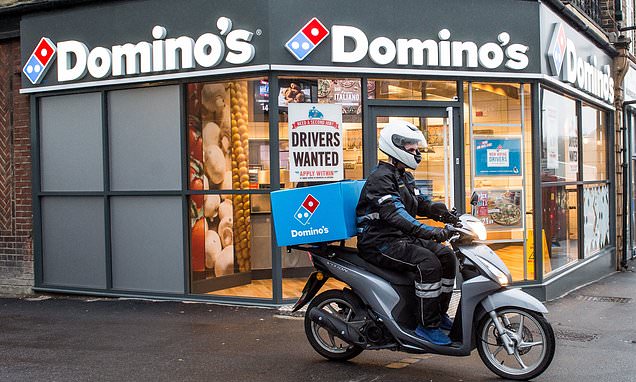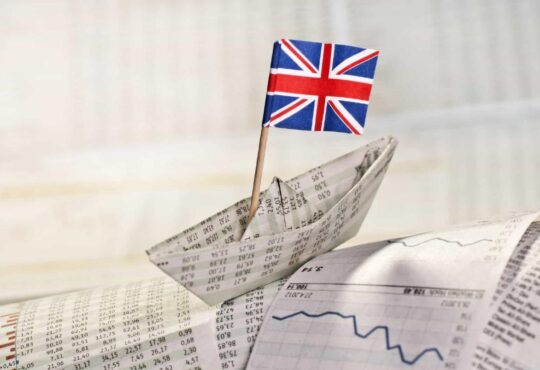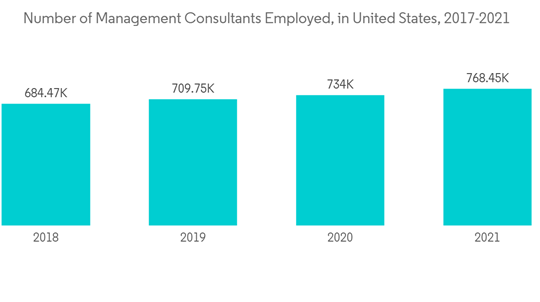Domino’s Pizza serves up higher sales AND profits as it enjoys its best day on the stock market since December 2021

Domino’s Pizza saw a surge in takeaways being picked up by customers in stores rather than delivered to their doorsteps amid the cost of living crisis.
Collection orders of 12.2m in the six months to June 25 were 20 per cent ahead of the same period a year ago. Such gains were in contrast to a 4.4 per cent slump in takeaway deliveries.
Even as the cost-of-living crisis squeezed spending, sales across the group’s franchised and corporate stores during the period were up 7.9 per cent year-on-year.
And profits of £68.7million were 8.2 per cent higher than same period a year ago.
Domino’s expects its profit for 2023 to range between £132million and £138million, beating the £127.6million analysts had forecast.
It is in the process of handing back £20million of shares to investors and vowed to return another £70million.
Shares soared 13.1 per cent, or 45.4p, to 392.8p, marking its best performance since December 2021 when the stock jumped 22 per cent after it secured a resolution with its franchisees.
Last month the group appointed Andrew Rennie as chief executive, and he starts on Monday.
He spent more than two decades with Sydney-listed Domino’s Pizza Enterprises (DPE). He will replace Elias Diaz Sese, who had been running the company on an interim basis since last October.
Laith Khalaf, head of investment analysis at AJ Bell, said a 20 per cent increase in collection orders shows ‘consumers are finding ways to save money and still get their favourite food treats’.
Related Articles
HOW THIS IS MONEY CAN HELP
He added: ‘Anyone willing to go to their local store can typically get a big discount on a collection order at Domino’s.
‘In the current cost-of-living crisis, Domino’s has to take that trend as a win – after all, it’s better to shift a chunk of pizzas at a lower price than none at all.’
The FTSE 100 fell 0.43 per cent, or 33.14 points, to 7666.27 and the FTSE 250 lost 0.41 per cent, or 78.1 points, to 19065.66.
4imprint flew high at the top of London’s second-tier. The group, which sells promotional products ranging from bags to notebooks and toys, raised its forecasts for 2023. Shares soared 16.1 per cent, or 715p, to 5150p to a record high.
Orders since the start of the year were 18 per cent ahead of the same period in 2022, the company said.
As a result, 4imprint expects to make at least £1.01billion of revenue this year alongside a minimum profit of £98million.
That would beat the £1billion and £87million figures analysts expected.
Defence and space manufacturer Chemring launched a share buyback programme worth up to £50million. Shares rose 7.6 per cent, or 21.5p, to 305p.
Fresnillo’s revenues of £1.05billion in the first half of 2023 were 6.7 per cent higher than the same period a year ago after an increase in silver and gold production alongside stronger precious metal prices.
But profits tumbled by nearly 70 per cent to £38million – falling short on market expectations of £96.3million – while the cost of doing business soared. Shares sank 4.4 per cent, or 27.2p, to 591p.
Weir Group said its profit for this year to be at the top end of the £428million to £464million range analysts had forecast.
The Glasgow-based engineer’s revenues of £1.3billion in the first six months of this year, meanwhile, were 19 per cent ahead of the same period in 2022.
And profit soared 35 per cent to £170million. Boss Jon Stanton also said the worldwide push to decarbonisation has led to its mining clients investing in sustainable technology. Shares rose 2.2 per cent, or 39.5p, to 1874.5p.
Coats, which supplies threads and zips to dress and shoe makers, said it expected to increase its market share in the clothing and footwear industries. Shares gained 5.4 per cent, or 3.8p, to 73.8p.
Some links in this article may be affiliate links. If you click on them we may earn a small commission. That helps us fund This Is Money, and keep it free to use. We do not write articles to promote products. We do not allow any commercial relationship to affect our editorial independence.






